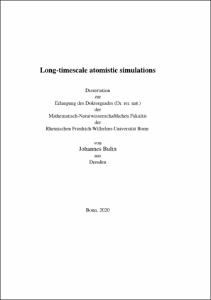Long-timescale atomistic simulations

Long-timescale atomistic simulations

| dc.contributor.advisor | Griebel, Michael | |
| dc.contributor.author | Bulin, Johannes | |
| dc.date.accessioned | 2021-03-31T12:04:21Z | |
| dc.date.available | 2021-03-31T12:04:21Z | |
| dc.date.issued | 31.03.2021 | |
| dc.identifier.uri | https://hdl.handle.net/20.500.11811/9016 | |
| dc.description.abstract | The simulation and analysis of particle systems dynamics is an important subfield of computational materials science. It allows the investigation of many properties of interest, such as reaction mechanisms, diffusion rates, and phase transitions. One way to simulate the dynamics is to integrate the (thermostatted) classical equations of motion in order to obtain the particle trajectories. This approach can only cover timescales up to a few microseconds, as the timesteps of the standard time-integration schemes are limited to a few femtoseconds due to stability restrictions.
This thesis provides an overview of algorithms that try to overcome this timescale problem by exploiting metastable behaviour of particle systems. The main focus is on on-the-fly Kinetic Monte Carlo algorithms that successively try to find metastable states of some given particle system. One such algorithm is the kinetic activation relaxation technique (k-ART) that recycles previously encountered local transition mechanisms in order to find new metastable states. The internal recycling procedure in k-ART was designed to work for crystalline materials but may fail when applied to amorphous systems. Thus the main contribution of this thesis is to remedy this problem by introducing a novel way to compare particle systems using a version of the root mean square deviation (RMSD) measure that is invariant under permutations and orthogonal transformations. It is proven that under certain circumstances, this invariant RMSD can be exactly calculated in polynomial time with respect to the number of particles. This new comparison procedure is utilised to build a modified version of k-ART called Localised Kinetic Monte Carlo (LKMC). In the used test problems, LKMC showed speed advantages on highly structured systems compared to a related (non-localised) on-the-fly Kinetic Monte Carlo algorithm. On a tested amorphous system this speed advantage vanished but was replaced by a major advantage in terms of accuracy as the internal localisation and recycling procedure allowed LKMC to find much more metastable states. | en |
| dc.language.iso | eng | |
| dc.rights | In Copyright | |
| dc.rights.uri | http://rightsstatements.org/vocab/InC/1.0/ | |
| dc.subject.ddc | 510 Mathematik | |
| dc.title | Long-timescale atomistic simulations | |
| dc.type | Dissertation oder Habilitation | |
| dc.publisher.name | Universitäts- und Landesbibliothek Bonn | |
| dc.publisher.location | Bonn | |
| dc.rights.accessRights | openAccess | |
| dc.identifier.urn | https://nbn-resolving.org/urn:nbn:de:hbz:5-61678 | |
| ulbbn.pubtype | Erstveröffentlichung | |
| ulbbnediss.affiliation.name | Rheinische Friedrich-Wilhelms-Universität Bonn | |
| ulbbnediss.affiliation.location | Bonn | |
| ulbbnediss.thesis.level | Dissertation | |
| ulbbnediss.dissID | 6167 | |
| ulbbnediss.date.accepted | 11.03.2021 | |
| ulbbnediss.institute | Mathematisch-Naturwissenschaftliche Fakultät : Fachgruppe Mathematik / Institut für Numerische Simulation (INS) | |
| ulbbnediss.fakultaet | Mathematisch-Naturwissenschaftliche Fakultät | |
| dc.contributor.coReferee | Schweitzer, Marc Alexander | |
| ulbbnediss.contributor.gnd | 1235356531 |
Files in this item
This item appears in the following Collection(s)
-
E-Dissertationen (4069)




